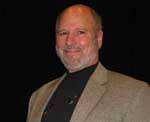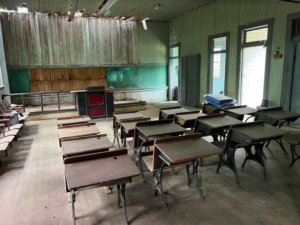By Jerry Klinger

Julius Rosenwald was a first-generation Jewish American. He was born in 1862 in Springfield, Illinois, just a few blocks from where Abraham Lincoln lived.
Rosenwald grew up and achieved the American dream. He became very wealthy through hard work, skill, and luck. He was a modest man with a philanthropic bent shaped by his Jewish traditions.
In 1911, Julius Rosenwald met Booker T. Washington at a Chicago fund-raising event. Washington had been born into slavery. Through hard work, skill, and luck, he raised himself up to become the President of Tuskegee University. The two men discovered a commonality in their mutual outlooks of how to better Black America and, in turn, America.
Rosenwald and Washington knew education was the key to transforming the future. The problem they understood was simple and immense. The vast majority of Black Americans lived in the rural areas of the 15 States of the South. Because of institutional and political racism amplified by societal terrorists such as the Ku Klux Klan, Black Americans were universally denied equal access to education, schools, books, teachers, and support. Without education, the future for Black Americans was bleak. The future for America was bleak.
Rosenwald and Washington combined their efforts to do good. Through Washington’s mentoring, Rosenwald created the Rosenwald Fund in 1917. The Rosenwald Fund achieved the impossible over the next two decades. The Fund brought together courageous Blacks and Whites. Together, Rosenwald, Blacks, and Whites overcame incredible difficulties. They built over 5,400 schools, teacher’s homes, and industrial training centers across the South. With Rosenwald matching grants, Blacks and Whites transformed America through commonality, mutuality, and respect.

Today, there are about 400 Rosenwald Schools left standing. A few Rosenwald Schools have been restored for posterity. Here and there, a few historical interpretive markers are put up to tell the story.
Most of the Rosenwald School markers omit the most important reason that Rosenwald used his wealth for good. Most of the markers leave out that Rosenwald was a Jew.
There is a second, very serious, untold reason that Rosenwald did what he did. It too was central to his actions. Rosenwald could not share it comfortably with Americans of his time; antisemitism was growing rapidly. It is a fear rarely, publicly, shared by Jews today as well.
In an undelivered speech Rosenwald had written, he explained an American Jew needs to be aware of the oppression of the other. If the American Jew does not work against evil, evil will eventually come to the Jew.
Jews then and today have a long memory of Jewish oppression.
The Jewish American Society for Historic Preservation (JASHP) has funded and placed more Rosenwald School markers than any organization in the U.S. Local communities are encouraged to write the text telling their story. JASHP has one sponsorship requirement. Rosenwald’s Jewish ethnicity must be recognized.
JASHP has worked to correct historical narratives that “overlook” Rosenwald’s Jewishness. JASHP continues to look for opportunities to support communities that wish to tell their Rosenwald story.
Recently, I was searching for counties in the South with the highest concentrations of Rosenwald Schools. I came across a remarkable article written by Brian Davis, the executive director of the Louisiana Trust for Historic Preservation. Davis said Claiborne Parish, Louisiana had 34 Rosenwald Schools, Caddo Parish 37. The article appeared in the Louisiana Endowment for the Humanities’ blog, 64 Parishes. Statewide there were ~395 Rosenwald Schools. The article drew my attention because Davis did what most did not, he recognized Julius Rosenwald was Jewish.
I contacted Brian. We connected. We mutually understood remembering the past shapes the future. Historic preservation and education share a commonality.
Brian has a particular interest in researching and locating Rosenwald Schools in Louisiana. In 2020, when he began his efforts, there were only three known surviving Rosenwald Schools in the State. Since, he has identified 18 Schools. His efforts are far from over.
Rosenwald historical interpretive markers are not the-run-of-the-mill Washington slept-here types. They are especially important to our contemporary society. Today we are deeply divided, and politically polarized. Hatred and antisemitism are rising. It seems we will never work this out.
The Rosenwald Schools came about 100-plus years ago when yesterday’s divisions, racism, antisemitism, hatred, and ignorance were multiples of today’s tensions. If Blacks, Whites, and the polarized could come together to do good then, we certainly can today. To do good takes courage and determination.
I explained my objectives to Brian, marking Rosenwald Schools. I made him an offer. JASHP is willing to fund historical interpretive markers under the Louisiana Trust for Historic Preservation, to tell the story of the Rosenwald Schools, one in each of Louisiana’s 64 Parishes.
All too often, offers are made, and responses are tentative.
Brian’s response was not tentative. It was definite, yes.
We needed to meet.
I flew to Shreveport.
Brian toured me through the northwest corner of Louisiana, where records indicate there were over 100 Schools. Brian has identified a surviving few. We looked at Mt. Olive School in Claiborne Parish, a two-teacher home in Union, and the Plain Dealing School in Bossier.
We outlined our objectives, defined the process, and began the efforts.
We may not be successful. We do not have permission not to try.
*
Jerry Klinger is the President of the Jewish American Society for Historic Preservation, www.JASHP.org